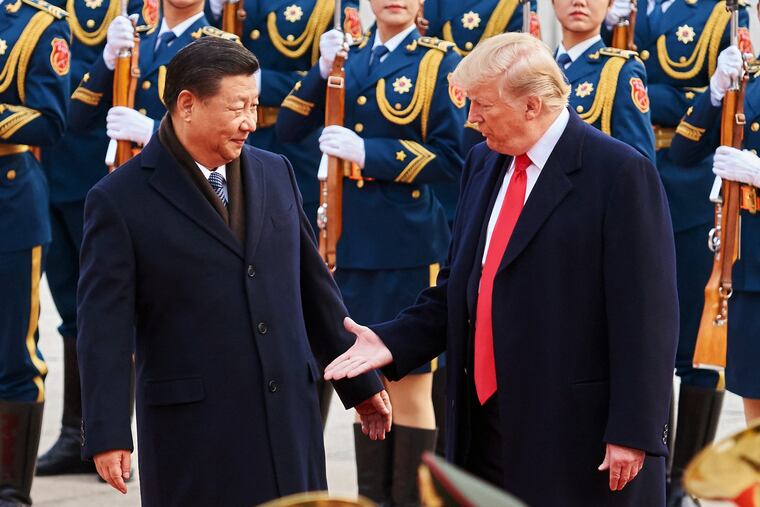Don’t expect miracles when Trump and Xi meet at G-20 | Trudy Rubin
The Chinese hope the two can resolve tariff friction, but the rivalry is likely to only get hotter.

BEIJING — In the Chinese capital, the buzz words these days are "Buenos Aires" and "midterms."
As the Trump-led trade war with China heats up, Washington is signaling a more confrontational relationship with Beijing. But the much repeated mantra here, from officials, think tanks, and academics, is that Presidents Trump and Xi Jinping will ease tensions when they meet at the G-20 conference next month in Argentina. Another mantra argues that a Democratic takeover of the House of Representatives in midterm U.S. elections will cool Trump's ardor for sanctions.
Both hopes are misplaced, not the least because the Democrats are no friendlier to China on trade than is Trump.
More importantly, the tariff war – or "tariff friction" as it's called here in an effort to downplay it – is about something far bigger than trade. It is about whether the world's two most powerful nations can manage a growing rivalry without clashing.
From my conversations in four Chinese cities, leaders are unlikely to bow to U.S. pressure, especially since they are uncertain about what Trump is really after. And the administration's public slamming of China makes it tougher for Beijing to compromise without losing face.
>> READ MORE: I'm heading to China to report: Are Beijing and Washington headed toward a new Cold War? | Trudy Rubin
The atmosphere here is very different from my last visit two years ago. Xi Jinping has cast himself as a modern Mao Zedong, who has abolished presidential term limits and tightened domestic controls. Heart-shaped medallions on sale in tourist shops feature Xi's picture on one side and Mao's on the other.
The internet is much more tightly controlled, and it is much harder to use VPN software to jump the government's "great firewall" that blocks unwanted foreign content. When I checked into my hotel room in Beijing, a card on the desk announced "Internet Connection: in accordance to regulations in China the following websites are not accessible, including, but not limited to Facebook, Instagram, Twitter, YouTube, Google, The New York Times, and Bloomberg."
Chinese are much more cautious about being quoted by foreign journalists than on my last trip, and almost no one I met would talk on the record.
Xi is out to Make China Great Again. Unlike previous Chinese leaders, he has been very vocal and public about his aspirations, vowing to catch up with the USA in tech by 2025 and to restore China and its military to great-power status by 2049, the centennial of the founding of the People's Republic.
Over and over, Chinese officials and international affairs experts repeat that China has no possibility, nor any desire, to catch up with or take over from America as global leader in the near future. Put aside for a moment the rapid Chinese military buildup, the growing blue water navy, the massive infrastructure loans to developing nations (no room to describe all that here). A look at the speed of China's massive, state-driven infrastructure investments at home, makes it hard to accept these disavowals.
Traveling in coastal Shandong province, for example, you can see massive new construction of handsome high-rise apartment buildings with stunning waterfront developments, walkways, and malls, in attractive cities such as Yantai and Qingdao (first developed by Germans, who brought the beer industry with them). Even smaller cities, such as Yantai, have newish airports.
In Qingdao, the first fully automated port in Asia just began operations, and I watched trucks and colorful forklifts move containers without any humans on site. Yantai has developed a wine industry, complete with chateaus modeled on French counterparts and wine tastings, and sizable exports to Europe. Once muddy farm villages are being transformed into tourist destinations with spas and rental bungalows, where urban Chinese and their kids come to pick apples and return to nature.
Indeed, since 1978, China has developed a middle class that is larger than the entire population of the United States, and you can see its members at the malls that dot every big city.
Which brings us back to the issue of tariffs, and why it is so symbolic of the new rivalry between China and the USA.
The mantra I heard repeatedly from Chinese officials was that China remains a poor, developing country, even though China loans billions to African states in development aid.
In fact, China has a huge domestic market that should be accessible to foreign companies. Yet China uses state subsidies, preferential loans, and protection of domestic markets to deter U.S. companies – even as Chinese officials deny any discrimination. And it compels U.S. companies to transfer technology as the price of operating in China.
No wonder American companies in China are pleased that Trump is talking tough on these issues, even though they don't believe tariffs will change China's behavior. The widespread assumption here is that Xi can and will ride out the tariff pain as China weans its economy from export-driven growth to reliance on its enormous domestic markets.
There will be no miracle in Buenos Aires. One can imagine Trump declaring his love for Xi in a flurry of tweets.
But the bigger question is how Beijing and Washington proceed if there is no progress in Argentina. The tariff war is only a prelude to much more dangerous competitions ahead.